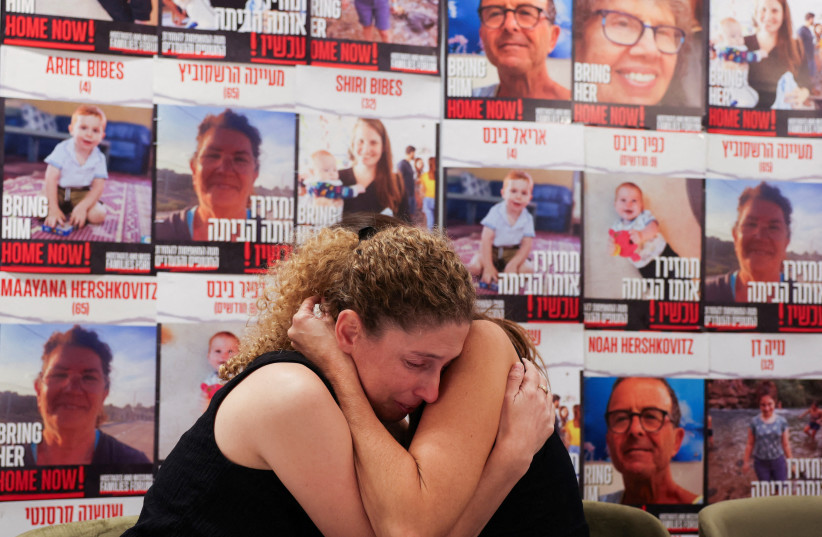Israeli physicians concerned with the health of the more than 150 abducted and missing Israelis aged nine months to 90 years old held by Hamas terrorists in the Gaza Strip say they need urgent medical care and treatments.
The doctors call themselves the Hostages and Missing Families Forum and are headed by Prof. Hagai Levine, chairman of the Israel Association for Public Health Physicians. They have compiled a list of the illnesses the hostages suffer from and what lifesaving medications they urgently need to the International Committee of the Red Cross (ICRC) in Geneva.
“Many of the abducted and missing civilians are in life-threatening conditions and in urgent need of treatment and lifesaving medication or injuries,” the document says.
“Based on initial and partial intake from their families, many of them need immediate humanitarian intervention due to their medical conditions, including cancers, Parkinson’s disease, cardiovascular diseases, heart failure, and type-2 diabetes.”
“There are also many wounded, whose limbs have been amputated or [who have been] raped by terrorists, or patients with special needs, such as autism [and] dementia,” the doctors wrote. “They are prone to immediate death because they are not receiving essential medications and treatment. They are at risk for severe complications, and they undergo unimaginable suffering. They need urgent care by medical teams. In addition, they are all under mental stress that can worsen diseases in a population of infants, children, elderly, and people with chronic conditions.”

A detailed database of more than 150 people, Israelis and dozens of foreigners, was sent on October 14 to an ICRC contact person, with an update later. This was not the complete number of people, they wrote.
The diseases the hostages and missing are suffering from include: malignant diseases, heart failure, chronic kidney disease, Parkinson’s disease, Alzheimer’s disease, other dementias, type-2 diabetes, stroke, autistic spectrum disorder, autoimmune diseases (including inflammatory bowel diseases, multiple sclerosis, psoriasis, and rheumatoid arthritis), asthma, chronic obstructive pulmonary diseases, hypertension, cardiac arrhythmia, allergic conditions, glaucoma, and psychiatric disorders, the forum wrote, adding that some of the victims were wounded when abducted and need immediate care.
The medication the hostages need include: diabetes medication (insulin, metformin, SGLT2 inhibitors); hypertension and heart medication (ACE inhibitors, ARBs, beta blockers, SGLT2 inhibitors, statins); anticoagulants (warfarin, apixaban); antiplatelets (aspirin, clopidogrel); asthma and COPD inhalers; biologic medications (adalimumab, IVIG); immune suppressants (methotrexate, mycophenolate); cancer drugs (tamoxifen, pegfilgastrim); Parkinson’s medication (levodopa); urinary medications (alpha blockers, antimuscarinic); psychiatric medications (antidepressant, antipsychotics and sedatives); antihistamines; eye drops for glaucoma; and medical nutrition (Ensure, Peptamen).
In addition, there is a need for baby formula.
The document lists examples of the captives’ needs:
• A one-year-old baby who relies only on food formula and needs immediate aid and supply of food and essential baby materials.
• A five-year-old, a 13-year-old, and a 16-year-old with autism who need special assistance.
• A 23-year-old woman with gunshot wounds who needs medical attention.
• A 27-year-old woman with Crohn’s disease who requires biological treatment and medical nutrition treatment due to risk of the disease worsening.
• A man with severe autoimmune disease who requires biologics treatment in a hospital due to risk of the disease worsening and death.
• A 60-year-old man with multiple sclerosis who cannot walk independently.
• An 85-year-old woman with heart failure, kidney disease, asthma, and cardiac arrhythmia with risk of developing blood clotting, fluid retention, and death.
• An elderly woman with Parkinson’s disease, dementia and needs adult diapers. She is underweight with risk of her disease worsening and death.
The Israel Pediatrics Association has also called on the ICRC to take action to gain the immediate release of the captive babies, toddlers, and children and all the abductees in Gaza.
“All international treaties require its immediate intervention and humanitarian aid,” it said. “No baby, child, or abductee... must be left without contact with the International Red Cross and without immediate medical attention.”
The ICRC has not yet answered the forum’s call, but a few days ago it said: “Nothing can justify Hamas’s abhorrent actions on October 7… Our hearts go out to people who lost family members or are worried sick about loved ones taken hostage. We reiterate our call for their immediate release and stand ready to conduct humanitarian visits. But those attacks cannot in turn justify the limitless destruction of Gaza. The parties must not neglect their legal obligations regarding the methods and means used to wage war."
“The instructions issued by the Israeli authorities for the population of Gaza City to immediately leave their homes, coupled with the complete siege explicitly denying them food, water, and electricity, are not compatible with international humanitarian law,” the ICRC said.
